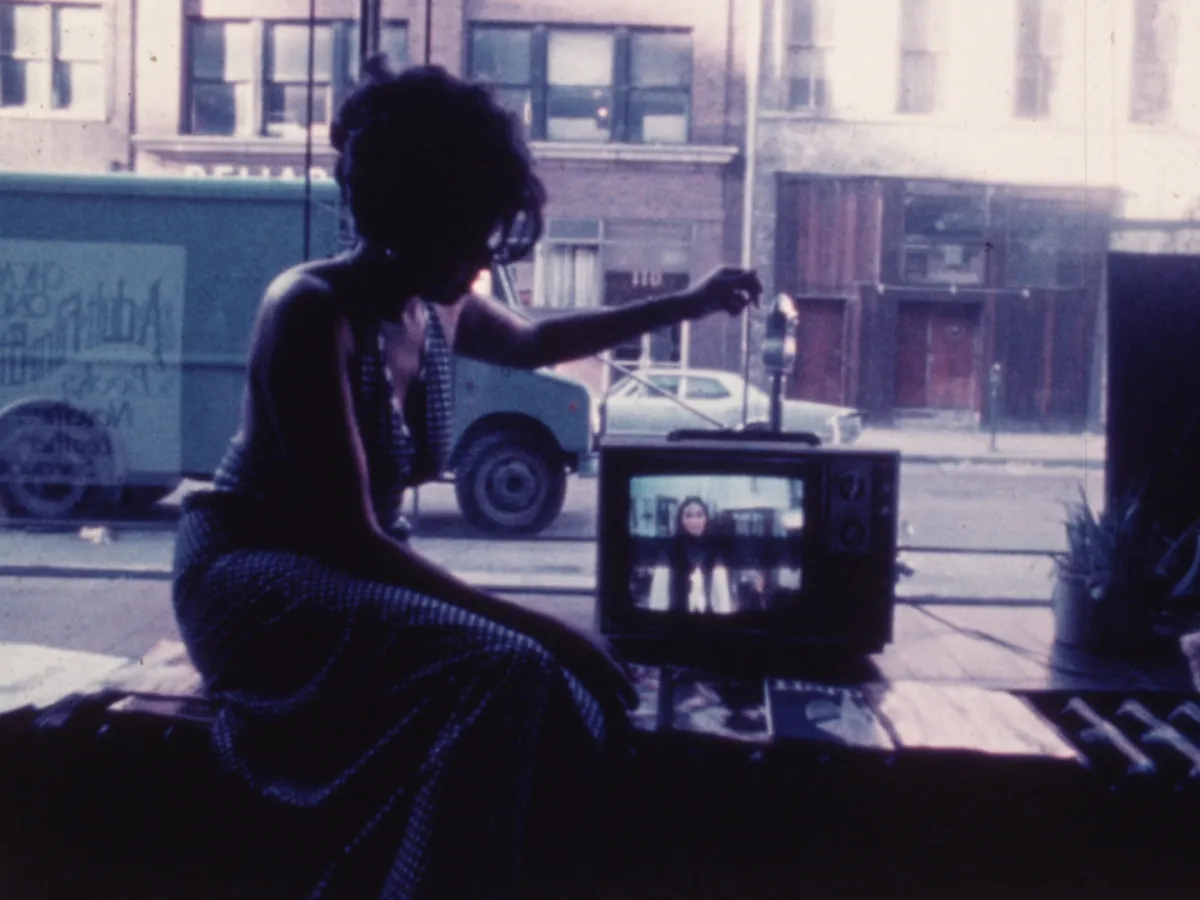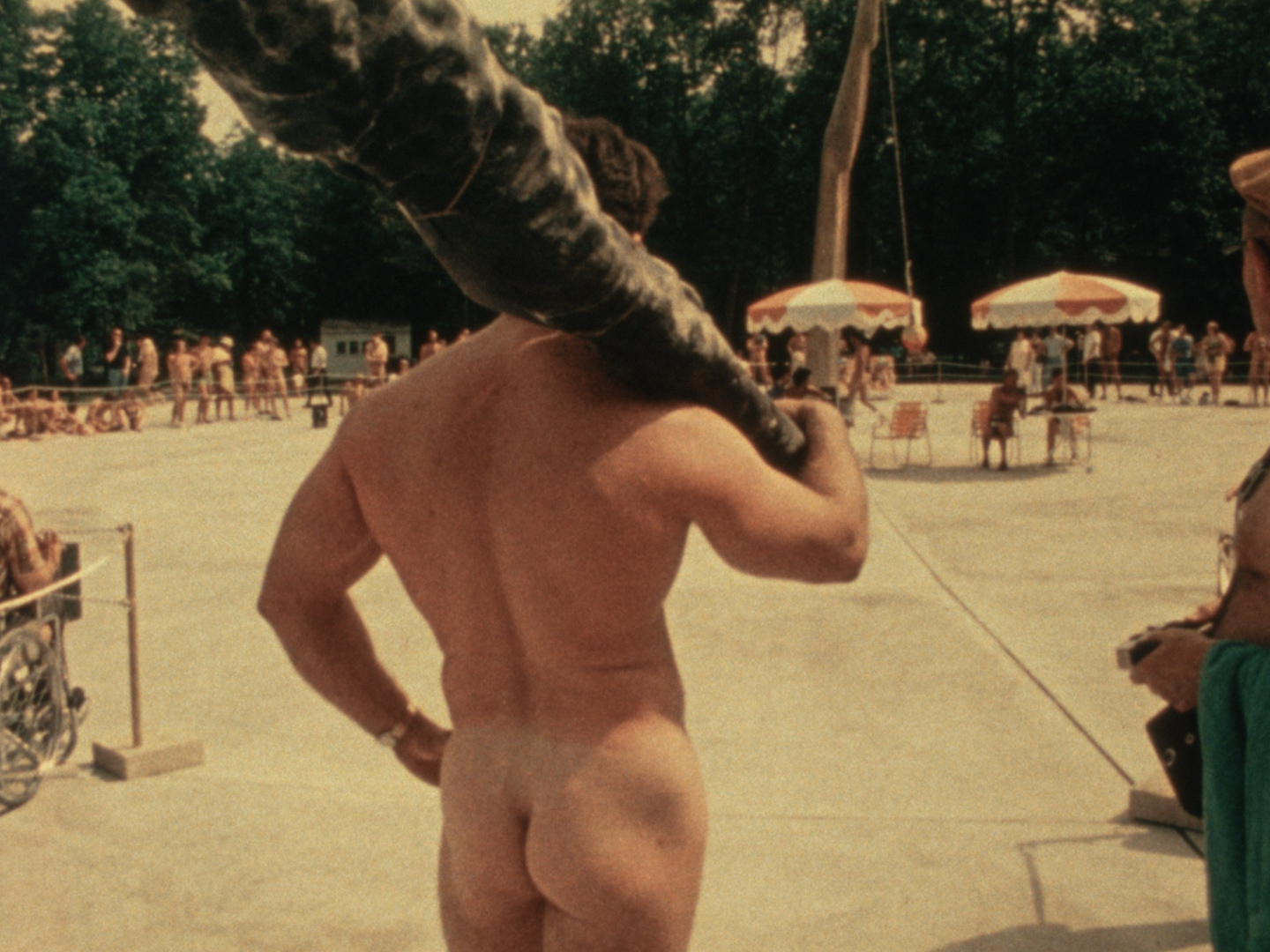

Still from "Hot Nasty." Image courtesy of Metrograph.
Many media depictions of Chicago don't resonate with me. As someone raised in its northern suburbs, I'm happy to watch works such as The Dark Knight (2008), Widows (2018), or one of the Kartemquin documentaries shot in the city. However, most of them focus on the city's corrupt politics or have a strong crime element in the story. In a saturated media market where (true) crime sells, a story's criminal and political attention-grabbing subject can overshadow the aspirations of real-life residents. St. Louis–born, Chicago-based visual artist Tom Palazzolo viewed Chicago differently than many (outsider) filmmakers by prioritizing his participants and subtilizing Chicago's "corrupt" politics. Last month, I caught his works at Metrograph, which screened the most extensive retrospective of his works in New York City. Comprising 17 shorts across four in-person programs, the films were themed around joyful gatherings, sexual desires, overt politics, and character portraits.
Palazzolo, who was interested in drawing as a kid and studied painting at the School of the Art Institute of Chicago, fell into filmmaking by chance. The photographer Kenneth Josephson gave him a 16mm Keystone camera after Palazzolo signed up for Josephson's course. After watching the cinema vérité of D.A. Pennebaker and Richard Leacock, Palazzolo understood how analog, lightweight cameras "made it easier to make sync-sound films." Combining his multidisciplinary background and recent cinematic epiphany, Palazzolo started independently producing an oeuvre where unconventional audiovisual pairings create a profound survey of humanity.
The bulk of Palazzolo's filmography documents celebratory civic participation, such as marches, parades, shows, and rallies. They range from community-oriented works such as a campy wedding shower in Ricky and Rocky (1972) and the La Grange pet parade in Pets on Parade (1971; both co-directed with Jeff Kreines)—the latter of which includes a bracingly awkward revelation that the runner-up for Miss Tinsdale is sitting with the winner in a parade car—to multicamera coverage of the 1976 Chicago Gay Pride Parade in Gay for a Day (1976). In addition, two of his films center on the bleak Chicago Democratic Convention in 1968—a 24-hour portrait of the event itself in Campaign (1968) and a juxtaposition with an Indiana nude competition in Love It/Leave It (1970). Though these gatherings are amusing on one level, they also offer ethnographic insight into examining what makes something intriguing, absorbing, and worthwhile.

Palazzolo and his camera find an engrossing resonance in being seen and accompanying others. For example, he desexualizes sex workers in Hot Nasty (1972) by accentuating a humanistic approach to labor. In the film, employees of the massage parlor Big Bertha recount the benefits of working in an unsustainable infrastructure while recollecting the sexual encounters that occurred in their shifts. One employee states a married man goes to her for advice on his life and characterizes it as "replacing the shrink that he would not go to." This testimony unveils that opposite-sex friendships can be formed even in venereal rooms.
In spite of Chicago's social hierarchy, there's an entertainment value in each of Palazzolo's shorts. They are acts of showmanship; Palazzolo's deft framing turns American denizens into stars. Figures such as Ron, the manager of an exotic wet T-shirt contest in I Was a Contestant at Mother's Wet T-Shirt Contest (1977), and Chicago's Nazi czar Frank Collin in Marquette Park II (1980; co-directed with Mark Rance) display their organizing skills and gather an audience to assist their respective visions, whether admirable or deplorable.
Palazzolo suggests that every place, even mundane ones such as delis and the street, can inspire art. In Jerry's Deli (1976), the eponymous deli owner (who is also an army veteran) reproaches and drags his unruly customers around in the fashion of Full Metal Jacket's Gunnery Sergeant Hartman. An elderly bird lover hops around with a bag to feed the pigeons in Pigeon Lady (1966). In Palazzolo's films, the participants put on a performance, meaning that they convey their beliefs, inner moods, and knowledge to the camera. The films question whether these performances are novelty acts or authentic experiences wherein the camera can sometimes highlight one's eccentrics over one's humanity. Palazzolo counters the spectacularizing of their oddities by spending an extended amount of time with each person, who shares their compassion and earnestness.
Palazzolo recognizes how local settings and customs are organized and perceives the absurdity of the daily minutiae beyond the surface. Though it's disheartening and not surprising to see the police in Marquette Park II backing—physically and ideologically—Nazis supporters hosting a public event over the counter-protestors concern for potential mayhem, it is funny to see Nazi leader Collin's unorganized search for a megaphone and his polemic being discarded behind a tree. His buffoonish complaint helps audiences punch up his white entitlement. During Collin's tirade, Rance and Palazzolo cut to one of his colleagues, saying the "American white man is one of the most brain-washed people in the world" before they walk back over to an infuriated Collin in a single shot. Palazzolo commonly uses the continuous shot to show that there's no B-roll.
He crafted many of his films alone, and it is evident in scene transitions that he is not presenting events chronologically. However, his superimpositions of the onlookers and marchers in America's in Real Trouble (1967), or a shot of three blandly dressed spectators looking at a jolly Pride Parade inserted into a sequence of the parade itself (accompanied by flute music) in Gay for a Day, emphasizes Palazzolo's need to supplement the grandiose. Due to the similarly colored skies within consecutive shots, the arrangement of the imagery is complementary and not obstructive to the festivities.
Palazzolo's camera often oscillates between the premier attraction and inconsequential yet visually stunning supporting characters to illustrate real-time thrill. His solo cross-cutting stands out in the entertainment documentary canon—primarily concert docs—where filmmakers deploy multiple camera operators to shoot the same people or cutaways to performance footage or exterior B-roll in interviews. In addition, the precision in his edits add humor by elevating absurdity. Examples include rapid cuts of a Black person wearing a white pride shirt with a Swastika between the parade in Gay for a Day and an inscrutable little girl sitting on a swing in an interlude to a beauty pageant in Labor Day East Chicago (1979). Palazzolo's cutaways do not abandon the ensemble but instead capture what others are doing on the peripheries.
A few of the parades' denouements have an unpredictable force that can quickly shift excitement into terror: patrons faint in Pets on Parade and Labor Day East Chicago, and a person throws an egg at Palazzolo in Gay for a Day. These instances don't denigrate the participants' devotion to a cause. Indeed, they occur in the face of catastrophe in the former and homophobia in the latter. Palazzolo commits to foregrounding the show people came to see and doesn't let the lead-up to the tragic moment veer the narrative's direction. The audiences' presence at these festive bashes signals mutual aid and differential shades of agreement, and affirms their existence in a country dominated by corporations and conservative ideals. Their mutual bonding shares an implied ideology of wanting to believe and live in a more progressive world.
The title card "Tommy Chicago" (one of Palazzolo's nicknames) is stamped in the final frames of his earliest films. No one can convey a whimsical yet wholehearted Chicago like Palazzolo. His Chicago contains idiosyncratic ceremonies, gratitude to the constituents that make Chicago exuberant, and humor to express the joy and curiosity that is embedded in humanity. Through his lens, we observe how the sociopolitical climate informs how people operate. Within these parameters, entertainers, laborers, and rallyists spread their message in their allotted time. They are ambitious, preternatural, and imperfect, just like the rest of us.
Edward Frumkin is a Brooklyn-based critic and filmmaker from the North Chicago suburbs. He has written for Frieze, IndieWire, BOMB, The Brooklyn Rail, and elsewhere.




